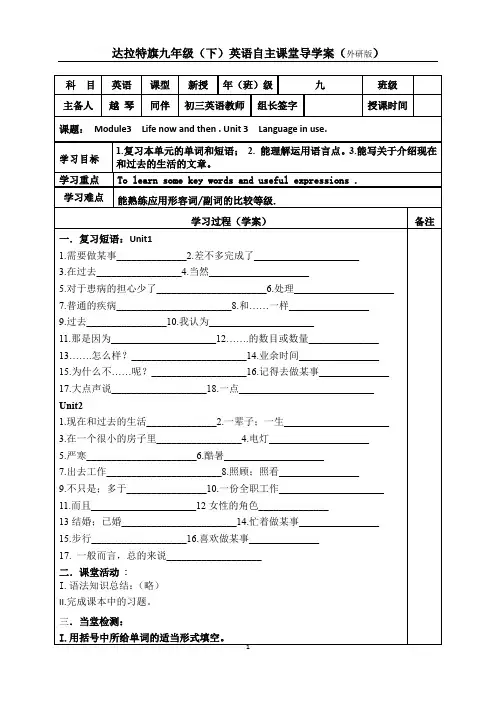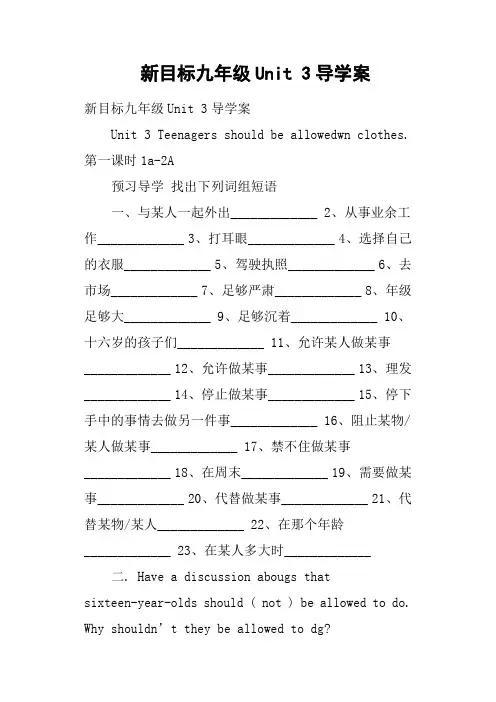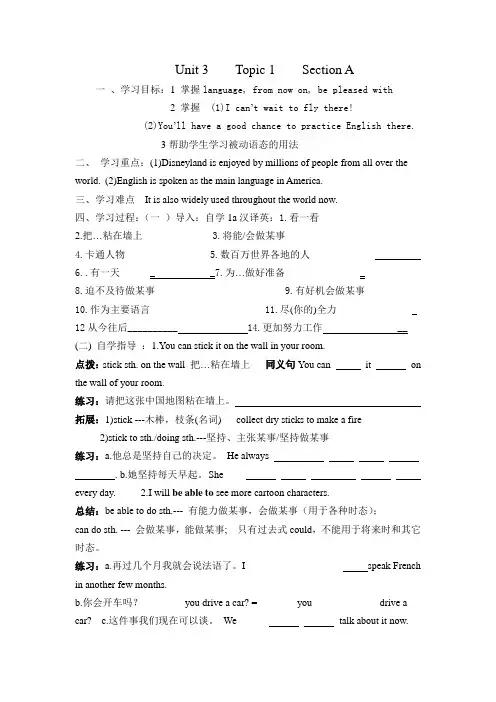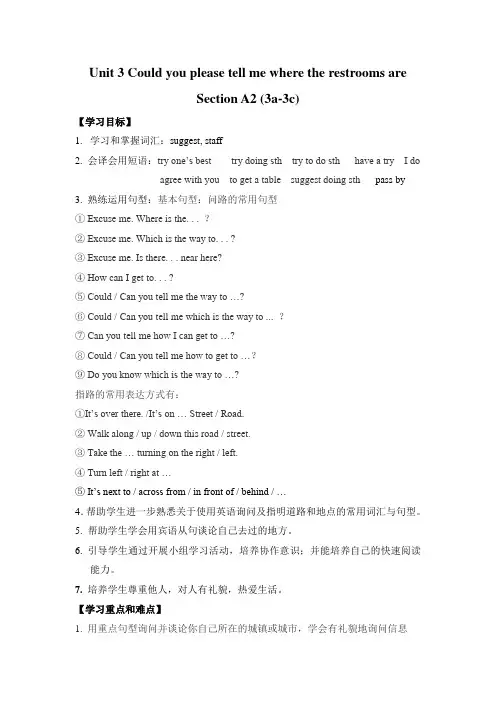九年级Unit3导学案
九年级下册Module3Unit 3导学案

1. The more careful you are, _______ (few) mistakes you may make.2. Her husband was not as _________ (friend) to them as her parents.3. Maths is one of _________ (important) subjects.4. If you want to keep fit, you’d better ea t more vegetables and ______ (little) meat.5. The population of Tianjin is _______ (small) than that of Beijing.II.单项选择( )1.The experiment was ______ easier than we had expected.A. moreB. much moreC. much( )2. Since China has been a member of WTO, English is ______ useful than before.A. moreB. mostC. much( )3. Wei Hua runs ______ than Li Fang.A.more slowlierB.much slowlyC.much more slowly( )4.The weather in China is different from ________.A.one in AmericaB. that in AmericaC.those in America( )5.Can you tell me which season do you like ____?A. wellB. betterC. best四.请根据下表所列的内容要点以Changes in my hometown为题目, 用英语写一篇短文。
人教版九年级 导学案Unit 3 Teenagers should be allowed to choose their own clothes

Unit 3 Teenagers should be allowed to choose their own clothes第一课时Section A 1a-2c【三维目标】1知识目标:四会单词短语及句型。
2能力目标:能在具体语境中正确运用被动语态。
3情感目标:增强交际能力,培养关心他人,礼貌待人的品质。
【学习重难点】:重点词汇用法及正确运用被动语态【学习过程】(一)预习导学:熟读单词并找出SectionA1a-2c中的重难点(二)朗读Section A 1a-2c,找出下列短语。
16岁的青少年____________________ 被允许__________________ 打耳洞___________和朋友一起外出_______________ 不够认真______________ 年龄不够大__________不够沉着__________________ 太狂热__________________ 太愚蠢______________(三)课堂活动.(教师寄语: 展示自我,合作提高)1.检查课前预习,小组合作交流讨论解决问题,并完成要点导学。
2. 听录音,完成1b,2a和2b。
3.读听力材料,理解以下几个句子:Go to the mall with John. Get her ears pierced. Is allowed to choose her own clothes(四)合作探究:Talk about what you are allowed to do导学1:teenagers should be allowed to choose their own clothes.(1).should be allowed为含有情态动词的被动语态,英语动词有两种语态,既主动语态和被动语态,主动语态表示主语是动作的执行者,被动语态表示主语是动作的承受者.被动语态的构成:主语+be+及物动词的过去分词be有人称和时态的变化.Eg: 我们学校每年都栽树. Trees in our school every year.这本书是昨天买的The book yesterday.含有情态动词的被动语态其结构为:情态动词+ be+及物动词的过去分词Eg: 作业应该按时上交。
新目标九年级Unit 3导学案

新目标九年级Unit 3导学案新目标九年级Unit 3导学案Unit 3 Teenagers should be allowedwn clothes. 第一课时1a-2A预习导学找出下列词组短语一、与某人一起外出_____________ 2、从事业余工作_____________ 3、打耳眼_____________ 4、选择自己的衣服_____________ 5、驾驶执照_____________ 6、去市场_____________ 7、足够严肃_____________ 8、年级足够大_____________ 9、足够沉着_____________ 10、十六岁的孩子们_____________ 11、允许某人做某事_____________ 12、允许做某事_____________ 13、理发_____________ 14、停止做某事_____________ 15、停下手中的事情去做另一件事_____________ 16、阻止某物/某人做某事_____________ 17、禁不住做某事_____________ 18、在周末_____________ 19、需要做某事_____________ 20、代替做某事_____________ 21、代替某物/某人_____________ 22、在那个年龄_____________ 23、在某人多大时_____________二. Have a discussion abougs thatsixteen-year-olds should ( not ) be allowed to do. Why shouldn’t they be allowed to dg?go out wds every night drive have part-time jobs gadwn clwild too young too sillus enough not old enough not calm enougxteen-year-olds should be allowed to _______________________________.2.Sixteen-year-olds should not be allowed to ______________________because ________.★知识点拨1.allow“允许,许可”1).allow sb. to do sth. “允许某人做某事”2).be(not) allowed (to do sth).“(不)被允许(去干某事)例如:g.她允许我去钓鱼。
九年级Unit 3 topic1导学案

Unit 3 Topic 1 Section A一、学习目标:1 掌握language, from now on, be pleased with2 掌握(1)I can’t wait to fly there!(2)You’ll have a good chance to practice English there.3帮助学生学习被动语态的用法二、学习重点:(1)Disneyland is enjoyed by millions of people from all over the world.(2)English is spoken as the main language in America.三、学习难点It is also widely used throughout the world now.四、学习过程:(一)导入:自学1a汉译英:1.看一看___________2.把…粘在墙上______________3.将能/会做某事__________________4.卡通人物______________5.数百万世界各地的人_____________6..有一天_______ _7.为…做好准备________________8.迫不及待做某事__________________________9.有好机会做某事_________ 10.作为主要语言_______________________11.尽(你的)全力_______________ 12从今往后__________ 14.更加努力工作 __ (二) 自学指导:1.You can stick it on the wall in your room.点拨:stick sth. on the wall 把…粘在墙上同义句You can it on the wall of your room.练习:请把这张中国地图粘在墙上。
译林版英语九年级上册Unit3Reading导学案

Unit3 Reading导学案【学习目标】教师“个备”或学生笔记栏1.To understand how to write about problems and to express feelings2.To recognize and understand vocabulary about problems.3.To know the uses of “get”【重点、难点】1 学会分析文中宾语从句的结构。
2 写作中能使用文中的句子。
【课前预习】选用所给词语的适当形式填空Whether imagine on time hand in feel bad about1.I can’t ___________my life without hobbies.2.It is very important for students ____________their homeworkevery day.3.I am interested in _____________________ he will go abroador not.4.I have no time to play basketball every day because oftoo much homework. So I _______________ that.5.We must get to the station __________________, or we willmiss the train.【学习过程】Step1: Pre-readingStep2: While readingStep3: Listen the audio again and find the answers to the questions:Step4:Explaination1.be worth +n. The pen is worth 5 dollars.2.be worth doing the song is worth listening to.3.offer to do he offered to help me.4.offer sb. Sth. Offer me a jobStep5:Reading Read the text carefully.Step6:ExerciseStep7:Homework1. Revise this period2 .Remember the reading text【当堂训练】动词填空1.I hope this kind of problem must ________________(deal) with as early as possible.2.These days we _________________(revise) for the exams.3.The poor boy had to work all day ______________(support) his family.4.What about ______________(choose) one hobby or two?5.Do you think the book on Chinese History is worth __________(read)?6._______________(discuss) this problem is going to take a long time.Let’s keep our voice down so we___________________( not disturb) others.7.I __________(doubt) if he would come soon.8.Lisa is my good friends,she often offers us good ________(advise)?9.Have you ___________(choice) what you want for your birthday?10.One way ____________(solve ) your health problems is __________(take) more exercise and eat less sw eet food.11. He had no choice but _________(wait) in the shop.12.The boy did nothing but ____________(watch) TV all day.13.Amy ______________(teach) in this school since she _______ (leave) college.【课后提升】一,根据句义及中文提示写单词二.选择( )1.I agree _____ your plan, but I don’t agree _____ you.A.with,toB.on ,withC.to,withD.to,on( )2.Our teacher is very strict _____ us and he is strict ____ his teaching.A.in,inB.with,withC.with,inD.in ,with( )3.Liu Mei spends a lot of time _____ the rules to her friends.A.to explainB.explainingC.to askD.asking( )4.Simon hopes that his advice is worth ____ and helpful.A.takingB.to takeC.givingD.to give( )5.—There is still ____ time.You don’t need to hurry, Jack.A.a lotB.plenty ofC.littleD.lot of( )6.I wish I __________ full marks in all the exams.A.will getB.getC.can getD.c ould get( ) 7.Excuse me , could you tell me _____________?A . where does he live B. where he livesC. he lives whereD. if he lives where( )8.You hardly have supper in the restaurant, _______?A. don’t weB. don’t youC. do weD. do you( )9.Ken advised us ______ hills, but Lily preferred _______swimming.A. to climb, to goB. climbing, goingC. to climb, goingD. climbing, to go( ) 10. Please stay here. It’s raining _____ outside.A. hardB. hardlyC.heavyD. big( ) 11. Would you please tell me _____ to deal with all the problems?A. howB. whyC. whatD. which三.翻译句子1.我有时怀疑这部电影是否值得看。
九年级上册新目标 课件Unit 3导学案Section A2 (3a-3c)Section A2 (3a-3c)

Unit 3 Could you please tell me where the restrooms areSection A2 (3a-3c)【学习目标】1.学习和掌握词汇:suggest, staff2. 会译会用短语:try one’s best try doing sth try to do sth have a try I doagree with you to get a table suggest doing sth pass by3. 熟练运用句型:基本句型:问路的常用句型① Excuse me. Where is the. . . ?② Excuse me. Which is the way to. . . ?③ Excuse me. Is there. . . near here?④ How can I get to. . . ?⑤ Could / Can you tell me the way to …?⑥ Could / Can you tell me which is the way to ... ?⑦ Can you tell me how I can get to …?⑧ Could / Can you tell me how to get to …?⑨ Do you know which is the way to …?指路的常用表达方式有:①It’s over there. /It’s on … Street / Road.② Walk along / up / down this road / street.③ Take the … turning on the right / left.④Turn left / right at …⑤ It’s next to / across from / in front of / behind / …4.帮助学生进一步熟悉关于使用英语询问及指明道路和地点的常用词汇与句型。
Unit 3 Section B(3a-Self Check)导学案 人教版九年级英语全册
I can't imagine why he did that thing.
二、语序:(1)由于宾语从句要求陈述句语序,所以特殊疑问句在从句中要变成陈述语序。
如:How much does this coat cost? → I want to know how much this coat costs.
A.Thanks to B.Thanks for C.Thank toD.Thank for
( )2.The annoying alarm clock________ in the early morning every day.
A.wake me upB.wakes me up
C.wake up meD.wakes up me
迷人的________ 不贵的__________不拥挤的_______ 便利的_______
在….拐角_______礼貌的________ 不礼貌的_________礼貌地_________
正确的________ 直接的__________地下的_______ 课程_______
路过__________ 左拐_________ 在三楼___________
D.how should I get to the Pacific Cinema
( )6.--- Do you knowCindy is waiting for?
--- Her cousin. They're going to the park.
A. whatB. whichC. whomD. whose
九年级英语上册导学案
课题
人教版九年级英语第三单元导学案导学案
Unit 3 Could you please tell me where the restrooms are? 【单元学习目标】1.学会有礼貌的问路以达到购物或办事的目的。
2.学会为他人指示方向或路线。
3.学会在活动或者购物场所中表达自己的爱好和想法。
【单元重点难点】重点:1.学会礼貌询问语言Could you please tell me where…?Excuse me,do you know where I can …?2.学习宾语从句注意事项。
难点:掌握几种礼貌问路的方式Excuse me,do you know where I can buy some shampoo?Could you tell me how to get to the post office?Could you tell me where I can get a dictioary?Could you tell me where the Center Street is?第一课时Section A (1a-1c)主备人:马俊珍审核人:宋剑【学习目标】1.掌握词汇restroo m、stamp 、bookstore 、beside.2.宾语从句注意事项。
3.完成主要句型的学习和听力练习。
【重点难点】重点:学会有礼貌的问路以达到购物或办事的目的。
难点:问路和指路的几种表达方法。
【导学过程】一、课前预习取钱_______________ 得到几本杂志在右边得到城市的一些信息___________ 买些邮票______________ 买字典______________ 向左拐__________________ 向右拐_____________ 买一双鞋子二、自主学习、合作探究(一)自主学习1. 预习检查。
2. 朗读1短语,完成搭配练习。
3. 学习礼貌询问语言及回答Could you please tell me where…?Excuse me,do you know where I can …?Yes / sure. There ‗s a …4. 1b听力训练。
人教版九年级英语上册Unit3导学案
Unit 3 Could you please tell me where the restrooms are?Section A1 (1a-2d)【学习目标】1. 学习和掌握词汇:restroom,stamp,bookstore,postcard,pardon,bathroom,rush2. 会译会用短语:get some money get a pair of shoes buy some stampsget some information about the town go alonggo past turn left/right on the left/right3. 熟练运用句型:1.—Could you please tell me where the restroom is?—Sure, There is a restroom on Main Street2.—Do you know Where I can buy some stamps?—Yes, There is a post office on Center Street.3.—Can you tell me how I can get to the post office?—Yes, Go past the bank and turn right. The post office is on the right.4. 通过本节课的学习,懂得在向别人寻求帮助时,要有礼貌地发出请求,并对别人的请求给予帮助,明白帮助别人实际是在帮助自己。
【学习重点和难点】1. 掌握本课时词汇和句型,通过交流表达和听力训练,引入各种地点和方法来学习“Could you please tell me…?”。
2. 有礼貌地向他人寻求帮助并作出应答。
3. 正确使用含有wh-问句的宾语从句,有礼貌地向他人寻求帮助。
【课前预习】一、请根据中文意思写出下列重点单词。
九年级英语Unit_3导学案
玉城中学九年级Unit 3学案课型:新授审核:九年级英语组时间:学习内容:SectionB 2a—2d学习目标:1.掌握并综合运用所学单词2. 熟记自主学习及精讲点拨中的固定搭配学习过程:一.自主学习。
1.以…为基础;以…为依据________________2. 引导,导入____________________3. 礼貌地提出请求_______________________4. 礼貌地寻求帮助________________5. 做某事是不足够的________________________6. 依赖,依靠_________________7. 相互_____________ _______________8. 更有礼貌地_______________________9. 在大街上_________________10. 一个地下停车场___________________________ 11. 和某人讨论某事____________________12. 换零钱_________________________ 13. 准备某事_________________ 准备做某事_________________________________ 二.精讲点拨。
1. request 名词和动词,要求,请求(1) request 作名词时为可数名词,尤指有礼貌的“要求,请求”make a request for…―要求…‖by request 按照要求eg. We made a request for further information. 我们要求获得进一步信息。
She will sing a song for the Qeen by request. 按照要求她将为女王唱首歌。
(2) request 及物动词request sb. To do sth. ―要求某人做某事‖eg. We requested him to leave the room as soon as possible.我们请求他尽快离开这个房间。
- 1、下载文档前请自行甄别文档内容的完整性,平台不提供额外的编辑、内容补充、找答案等附加服务。
- 2、"仅部分预览"的文档,不可在线预览部分如存在完整性等问题,可反馈申请退款(可完整预览的文档不适用该条件!)。
- 3、如文档侵犯您的权益,请联系客服反馈,我们会尽快为您处理(人工客服工作时间:9:00-18:30)。
Unit 3 Could you please tell me where the restrooms are?Period 1 (new words)单词拼写1.He has been collecting s________ since he was eight years old.2.There is a b________ on the Center Street; you can buy some books there.3.The supermarket is _______(在…旁边) the flower store.4.Excuse me, where is the ______________(洗手间)5.The National Day is coming. I want to send some ________(明信片)to my friends.6.P______ me, could you tell me where the washroom is?7.Do you know how to get to the b___________? I want to take a shower.8.Chinese people n_________ have three meals a day.9.Tom s_______ to see the house but Ann was against it.10.I see the Twins p____ by my house every day.11.She and her ______(职员) wrote that letter.12.My son likes eating ________.(葡萄)tell me13.Could y ou tell me the way to the _______(中心的) Park?14.Excuse me, can you tell me if there is a post office n________?15.Jim, please help me get the m______ from the mail boxes.---OK.16.Go e______ the Main Street, and you can see a supermarket in the _______(角落)17.I live near the supermarket. It’s very c__________ for me to buy things.18.It’s important to know how to ask for help p__________.19.You can ask d______ questions when you speak to your friends.20.The answers to the questions are c________. You are right.21.The _______(发言人) in the meeting can speak many kinds of foreign languages.22.Could you tell me your e-mail a_______? I want to send you a mail.23.He will go to France and take a c_______ in art and design.24.Is there an u__________ parking lot over there?25.Our teacher gave us some r_________ about our homework.26.“Excuse me,could you please tell me where the bookstore is?” is a polite way to ask ford_________.27.People like to take the u________ bus when they are off from work.28.The things in that shopping mall are really i___________. Many people can afford them.29.Students should be pol ite to their teachers, because they don’t like i________ students.30.The tourists like to go to the park, because the sights there are really f__________Period 2 (SectionA 1a-2d)英语如何问路和指路(1)Excuse me. Could you tell me to the bookshop?(2)Excuse me. Could you tell me how the bookshop?(3)Excuse me. Could you tell me how to the bookshop?(4)Excuse me. Could you tell me the bookshop ?(5)Excuse me. is the way to the bookshop, please?(6)Excuse me. the bookshop, please?(7)Excuse me. How can I get to the bookshop, please?2、指路句型1). 回答Where's the (nearest)…? 可用以下简单的答语:1. It’s between the cinema and the fruit shop.2. It’s next to / in front of / behind / on the left (right) side of the library.3. It’s in / on / to the south / north / west / east of the park.2). 回答Which is th e way to…please? 和How can I get to…? 等问路的话时,可根据具体情况,将下列有关句子组织起来用:Walk along this road/street. 沿着这条路/街走。
It\'s about … meters from here. 从这里大约…米。
Take the lst/… turning on the left/right. 在第…个转弯处左/右转。
It\'s about … meters along on the right/left. 沿右边/左边大约…米。
Turn right / left at the first / second crossing / turning / corner.T urn right/left at the traffic lights. You\'ll find the … on the right/left.在交通灯右/左转,你会发现……在右/左边。
Go on until you reach the end of the road/street. You\'ll see the … in front of you.继续走一直到路/街的尽头,你就会看Go down this street/road until you reach the 1st/2nd/… traffic lights. Turn right/left. At the end of the road/street you\'ll see the …沿着这条街/路走一直到达第一/二……交通灯,右/左转,在街/路的尽头你会看到…31. A: Is there a pay phone __________ here?B: Yes, there is a pay phone __________ Center Street.2. A: Where’s Xinghua Park?B: It’s __________ Hongqi Supermarket and The Bank of China.3. The restaurant is __________ __________ the post office.4. The library is __________ __________ the pay phone.5. Forest Hotel is __________ __________ of the park.6. The pay phone is __________ the small supermarket.练评从ABCD中选择最佳答案.1. —Do you mind if I ________ the TV a bit?—Yes, I do, because I’m busy with my homework now.A. turn onB. turn upC. turn downD. turn off2. The lights must be________ before you leave the classroom.A. turned onB. turned upC. turned downD. turned off3. Don’t________ the radio. The baby is sleeping.A. turn offB. turn onC. turn overD. turn down4. How magnificent the Bund looks at night when all the lights are________ !A. turned overB. turned offC. turned downD. turned on5. —Her radio is too loud, isn’t it?—Yes. Let me tell her to________ .A. turn it upB. turn up itC. turn it downD. turn down it6. —The radio is too noisy and there is nothing interesting on it. Why don’t you________ ?—All right. I’ll do that.A. turn it onB. turn it offC. turn it backD. turn it upPeriod 3 (Grammar)特殊疑问词引导的宾语从句①宾语从句的连接词:特殊疑问词引导宾语从句时,从句的连接词由该特殊疑问句的疑问词充当。
